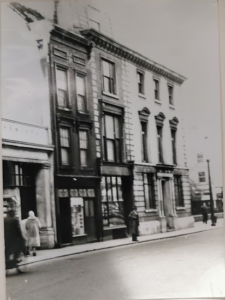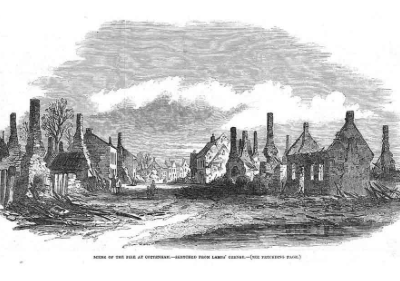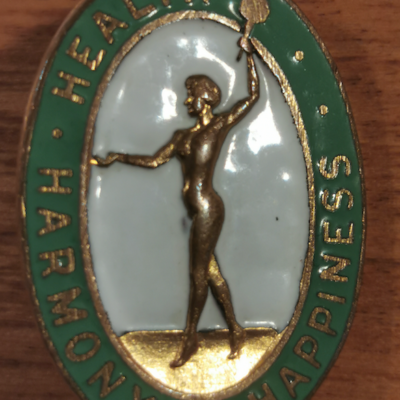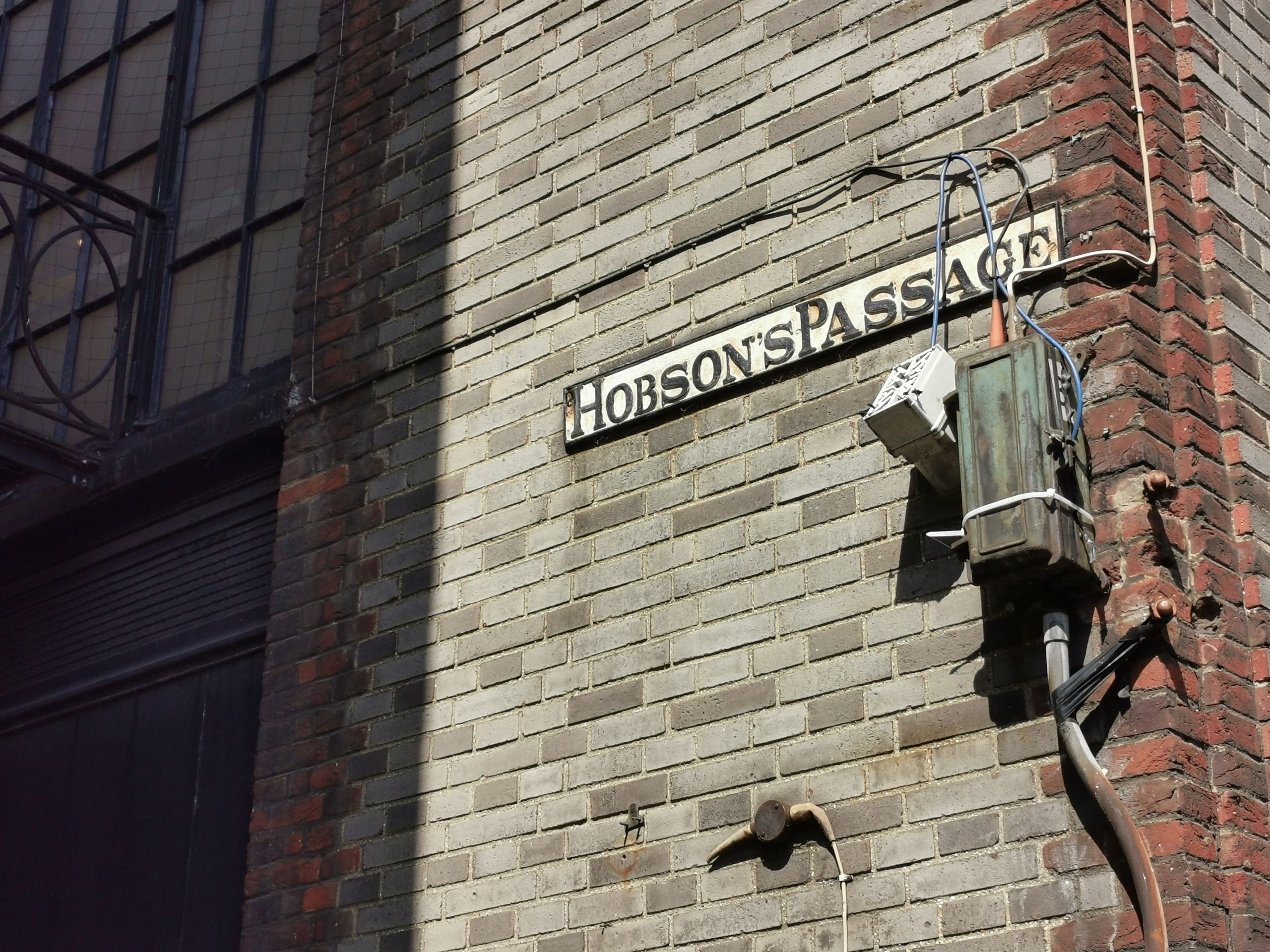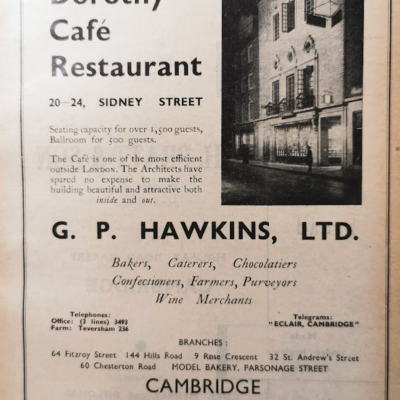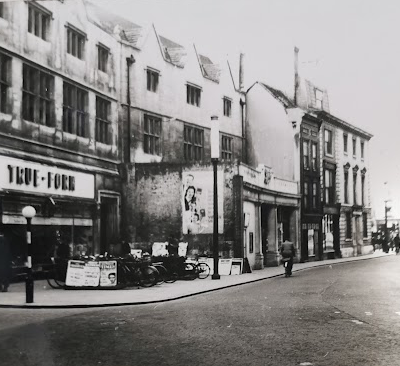Search by topic
- archaeology
- architecture
- bricklayer
- Building of Local Interest
- carpenter
- church
- crime
- dressmaker
- fire
- Great Eastern Railway
- listed building
- medieval
- oral history
- Public House
- Rattee & Kett
- Religious House
- Roman
- scholar
- school
- Then and Now
- tudor
- women
- work
- world war one
- world war two
Search by text
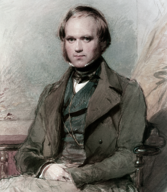 Charles Darwin
Charles Darwin63 Sidney Street
History of 63 Sidney Street
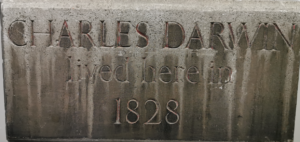
Commemorative tablet incised by Eric Gill and finished by Lawrence Cribb in 1927 © Museum of Cambridge
c. 1828:
The premises of William Bacon, tobacconist where Charles Darwin lodged as an undergraduate at Christ’s College
‘Darwin in Cambridge’ (John van Wyhe 2009) quotes from the Christ’s College Magazine of Easter Term 1911:
Mr Thomas Hunnybun was born in the year 1830 in the house on the opposite side of the street to the present No.63 [his father was Thomas Hunnybun, coachmaker] … Mr Hunnybun remembers that the house now occupied by Messrs Rutter and Son was once tenanted by by Bacon the tobacconist and that the latter used to let lodgings to University undergraduates, generally to Christ’s men. Mr Hunnybun says that he well remembers his father going on several occasions to call on the Master of Christ’s College to complain of the behaviour of the undergraduates at Bacon’s …. the sporting young gentlemen over Bacon’s were in the habit of leaning out of the windows and with tandem whips flicking the passers by.
1841 unnumbered
George Whitaker, 54, stationer
Thomas, 22
1850 (Slaters Directory)
Thomas Whitaker, bookseller and stationer
Cambridge Independent Press: 21.12.1850
SERIOUS CHARGE OF ARSON AGAINST FATHER AND SON AND THEIR COMMITTAL. On the 22nd of November, fire broke out in Sidney street, Cambridge, about twenty minutes before six o’clock, a.m., in a house occupied by Messrs. Whittaker and Son, who kept an old curiosity shop, and the house, furniture, and goods in the shop were speedily destroyed. The account given by the elder Whittaker was that he came downstairs with candle, and that an explosion of gas immediately took place, whereby his face was much blackened, and the shop immediately took fire. It had been noticed, however, that Whittaker had been seen outside his shop after the fire was raging, with his face not at all blackened; and this, with other suspicious circumstances, awakened a belief that there was something very mysterious relative to the cause of the fire. A coroner’s inquest was held, and after lengthened examination, the jury returned a verdict to the effect that there was evidence to show how the fire originated, but that they were unanimously of opinion was not caused by an explosion of gas. Mr. Whittaker having now made his upon the West England Fire Office, the Directors determined upon a prosecution, for his making a much greater claim than he was entitled, and Mr. Crowe, the proprietor of the house which was burnt, and who was not insured, also instituted a second charge, that incendiarism : and on Wednesday the case came on for hearing before the Borough Magistrates, C. Brown, C. Kinch, and G.Foster, Esqrs , and the following evidence was adduced, Mr. Rance appearing for the prosecution, and Mr. Naylor for the defence. The household furniture and stock were insured for £1,110 and the claim made was for £830.
Mr. Crowe: I was the owner of a house in Sidney-Street, occupied by Mr. Thomas Whittaker, and destroyed on Friday, 22nd of November. He had been my tenant since 1843; his father, George Whittaker, resided with him; the family consisted of four—father and mother, sister and son; they kept no servant. Within the last few months I took proceedings to get my rent; I authorised Knowles, the sheriff’s officer, to distrain for rent; distress was levied; Whittaker knew that my house was not insured. I mentioned it when both were in the shop; I also said that I did not insure any of my houses; I distrained for two years, amounting to £115: I had made repeated applications for my money.— By Mr. Naylor: The money was paid.
P.c. Maltby repeated his evidence as to the fire breaking out about twenty minutes before six ; found strong light in the shop; saw it through a fan light; there were three men there, but did not know who they were ; they were trying force the door; both fan lights over the door were whole. P.c. Barker up, and witness went to the station for the engine.
George Beaumont: Was there at a quarter to six ; the flames were coming out the shop door; heard no one in the house ; dared not venture in, the flames were too strong.
William Carter, surgeon, said his garden extended to the back of Mr. Whittaker’s premises, recently burnt; three windows from the back of Whittaker’s house looked into his garden; remembered Mr. Whittaker’ house being burnt down ; heard the alarm first about a quarter before six in the morning; got up and went down into his garden; proceeded to get his horses from stable, and saw Mrs. Whittaker in the house; she was shrieking at the window for help ; smoke was issuing from the window where she was calling for assistance; ran to procure a ladder, but she had escaped ; about half an hour afterwards saw the elder prisoner and Mrs. Whittaker in his (witness’s) garden; they were removing furniture. Mr. Whittaker at this time was very black in the face, and walked lame; Inspector Jaggard drew attention to Mr. Whittaker’s face; Whittaker consulted him (Mr. Carter) professionally, and at his request he examined his face; observed that his face was very much blackened, but not burnt, neither were his skin, hair, whiskers, or eye-lashes, burnt in the slightest degree – not even singed. Mr. Whittaker said he had hurt his knee, and asked him to examine it. Was certain an explosion of gas would not have produced the blackness on Mr. Whittaker’s face, and was equally certain that smoke would not have done it; did not recollect ever having had a case under his treatment from explosion of gas ; asked Mr. Whittaker how the fire originated, and he said that he was going into his when the gas exploded, and he was blown backwards; did not observe the state of his cravat or shirt; the injury to his knee was very slight: there was no external wound; it was slightly swollen.
A plan of the premises which were destroyed was here put for, and explained by Mr. Crowe. There was a yard about twelve feet square, covered in with glass between the front and back buildings, which were connected by a lean-to one side of the yard.
Thomas Stubbings lived in yard, in the third house from Mr. Whittaker’s; heard the alarm of fife about twenty before six; went down into the street, and saw Mr. Whittaker kicking at his door, dressed as usual; heard no explosion; if his face had been disfigured fancied he must have seen it; week previous, at six in the morning saw Mr. Whittaker moving goods from his house.
William Scott stated that on the morning of the fire he was going down Sidney-street, about half-past five o’clock, and he heard the cracking of glass inside Mr. Whittaker’s shop ; the fan lights were then whole ; he and some others tried to get in by a door; but Mr. Whittaker called out us that we could not get in there, and that there was a stack of chimnies which would on to us. He then went to the door next the Savings Bank, and burst that open; the elder Whittaker was trying to force the door he told us that we could not get in at; he then lost sight of Mr. Whittaker; when they burst open the door next the Savings’ Bank, the fire burst out and no attempt was made to get in: the chimneys were steady enough, and there was possibility of the chimneys then falling ; the flames had not then got through the first floor; Mr. Whittaker did not tell us to break the door open next the Savings Bank. If Mr. Whittaker’s face had been black,he thought he must have seen it.
James Hogger, corroborated the evidence of the last witness. When Mr. Whittaker called to us that it was no use forcing one of the windows, and told us to be mindful of the chimnies, there was not the remotest chance of their falling; his face was not black ; it was as usual; stopped at the fire till 8 o’clock, and never saw Mr. Whittaker again; the chimnies fell eventually, but not within half an hour of Mr. Whittaker’s caution; Mr. Whittaker did not walk all lame.
[The following section is difficult to read on the BNA Archive scan]
R. L. Ind stated that he remembered the fire at Mr. Whittaker’s; lived nearly opposite him, heard the alarm fift twenty minutes to six; was awake at the time, and heard was the fire about three or four minutes afterwards; when he the houi»e three four person* were Irving to break own the door nearest the Saving’s Bank; it was broken open, and he saw that the shop was in flames ; the fan lights were n«t ; saw Mr. Whit taker the road opposite tfjs ft ; Stoke him, saving it was a bad job i «m, and his son and dslighter hari&g slept that night in some premise* which he had taken Hobson’s.nUee, had got up with the intention calling his son ; and when got to the shop, with light in his hand, explosion took plsce. and he was knocked down. He had been trying to make Mr. Holt hear from the back part, but was unable; that he afterwards got out Mr. Carter’s garden, went through Stubbing*’* yard, and alarmed Mr. Holt and Mr. Steven* ; and that afterwards went to get his wife out of the honor, which he had great trouble do. Mr Whittaker’s face was not then black; saw him afterwards with his fars black all over, walking with a stick ; looked like sweep, and complairWd cf his knee being hurt, did not say in what war conversing with Whittaker, asked him h-» had saved his aicotmt books,’ and said ” Yes, had pOt them in a deak, which was sav^d.” The Coroner the Mr. King, produced yofantary statement made Mr. Whittaker. sen , fct.aa inoueat made him. touching the” destruction the shop occupied biro. conversation then took place the a the document signed by Whittaker, and was decided the Court that it shoulu be received …… The Coroner said that. the examination before him, a letter was handed him. in the writing of young Whittaker. at the dictation his father. The Curoner asked Mr. Whittaker if he wished to have re*d; said “Yes;” was cautioned, but persisted in hsving read, it was true statement The letter was accordingly read the Jury, in the presence 6f both Whittakers. reading of the letters was deferred till next examin it ion (on Clee stated that Mr. the eider, applied to him in September, about house belonging to a Mr. Wood I.OmK’n. and wkueh was taking care, said wvuld either buy the hour, or hire it for vm» ; wrote to Mr. Wood the subject, and afterward* «aw both prisoners, and told them that Mr. Wood would let the house for 21 year*; the elder Whituker said he wanted leave Sidney-street bectue Mr. Crowe had never behaved well to him, for he would never do any thing the premise*, and that he had served him with a prowm for rent; bat he (Whittaker; had not done with him jet, for would have hie revenge before he had done. Samuel Knowlea stated that on the of June last he issued a distress for rent Mr Whittaker’s premise*. warrant from Mr. Crowe, the landlord, for -tf’llJ. Ids. 3d., arrears of rent. When entered the arrangement was made, and third party paid the money . bat (Mr. Knowlea) took of a quantity Jewellery to his own house, lor lh’ security of the who advanced the money. As a farther security for the rent, some farther good* werr given him (Mr Knowlesj, which were put separately in room upstairs in Mr. Whittaker’s house ; this was d«me in the event nf the jewellery not being sufficient to satisfy the claim* the landlord this door was locked in witness’s presence, and the key given him,and thia key was again given up to Mr. Crowe’s agent Saw Mr. Whituker about 10o’clock on the morniug after the fire, and asked him if the gitods put apart meet deficiency of rent, if any, had been destroyed . and was answered that all was destroyed by the lire, and had not in the room since it had been locked up. Mr. Whittaker told him that the fire resulted from an eiplosioa of gas in the shop; that got early ‘ that morning to remove ate furniture ; his lace was luen black— a greasy, ahmey black. Henry Lyon, chemist, Petty stated that a fortnight before the fire had some conversation with old Mr. Whittaker shout his leaving his premises; he said he had been sued Mr. Crowe for rent, and that he should leave, and no more rent, as i the house was not safe; he also said that he should have sale and leave Cambridge: told Mr Whittaker that it was hardly worth having a sale, as the goods in the shop were not worth much 1 •aid they were no use to him, for he was discommoned by the University ayd could not sell; noticed on this visit th.it the best goods were gone ; was in the habit of going into the ehup. Joseph Doughty Heard the first alarm : there were only three four people oresent when got there went on the Petty Cury j and alarmed his sister; went in the garden and saw Mr. and Mrs. the? were sUnding beside some furniture, and were ! dressed; Mrs. Whittaker seemed as though she had been hastiiv dressed; Mr. Whituker’s face was black; it looked as though had been rubbed with a soot-bag and then with greasy cloth ; examined his eye lashes ; they were not singed ; hi* shirt front was quite clean ; he did not perceive the slightest appearance of lame – new till some hours afterwards ; Mrs. Whituker looked very calm and comfortable; Mr. Whittaker seemed agiuted, and said could not rest. I. Deck, chemist, stated that he had been practical chemist for forty years; gas once burst his premises, which nearly cost , his servant her life. If Mr. Whittaker had entered the door “of his back shop with lighted candle, and illusion of gas had taken place, would have been considerably injured, and doobt the , front of the shop would have been blown out; the report would have resembled an explosion gunpowder, and the noise would have been heard by the whole neighbotirhood With regard the explosion his own house, he said about three feet exploded, and the whole his premises shaken ; the servant had all her • hair singed, and her face, though scorched, was not least blackened ; there was norarhon with gas. which would be i create blackness; there must have been a large expl<Mion gas knock person dawn ; if any man be knocked down an exphudon from gas, must receive personal injurv, and his hair ‘ Vfiifiam Palmer, gas-fitter, stated that he remembered the fire on Mr- Whittaker s premises; went there about half past six a«n.; that fire was then burning he went again examine the stale of ptpos, the shop, about nine o clack-; examined the; state of the main tap it was fall on ; the tap was shnt , if one the burners had been escaping al. night.it wofcld he dangerous to take a light in the morning, and if the main tap had been open all night, the whole shop front would have been blown out The witness then gave illustrations of the of explosions of gas upon persons, the injuries they sustained bv burning, but (he said) it never made them black; a ” flush, with ant an explosion, would barn. Win. Henry Day stated that, the early part of July last saw Mr. Whituker, relative to a house wanted hire; he «aid the house he lived was in n very bad state of repair, and that old was rascal, and would not do anything, but would serve him out for it yet.” Mr. Huunybun stated that lived directly opposite the premise* that were burnt; heard an alarm of fire about twenty minute* before six ; looked out of his window, and saw from Mr. Whittaker’s house a strong yellow smoking light, but flame*; the fanlight was whole; heard no explosion, and was awake when the ala’..- was given. It being now five o’clock, the Bench determined to Mr. Brown asking Mr. Rauce if there were any e. idence forthcoming implicate Whituker, jun.—Mr. R.txrt said Ye*, making an over-claim on the fire office. Mr. Ranee then, at the «ugge*tiuu of the Bench, amalgamated the two cases, so that, if the prisoners are committed, there will be one indictment, with two counts. The case was here adjourned till Kriday morning, nine o’clock.
[The scan on the BNA is more legible from here]
FRIDAY. The inquiry resumed this day at half-past nine. The public attended in large numbers.
There were on the Bench—Charles Finch, C. K. Brown, G. E. Foster, and H. S. Foster, Esqrs.
Mr. W. Mitchell, jun., deposed to seeing the elder Mr Whittaker in the Red Lion Yard, between six and seven on the morning of the fire; he was going to the pump with two buckets; said to him “It’s a bad job,” and hoped he was insured ; he said,” Yes; but we have been moving [I think] three mornings, and we had got all away but our pictures.”
The Coroner was called to produce the statements made by the prisoners at the inquest.
Mr. Naylor thought that the Magistrates would not have these read, and objected more especially in the case of Thomas Whittaker, who attended by a compulsory process.
The CLERK said it was not probable that any one would commit perjury to condemn himself.
Several cases were cited on either side. Mr. Naylor admitted that the decisions were contradictory. The Bench decided receive these depositions, and they were accordingly read.
Mr George Spalding, jun.. superintendent of the Borough fire brigade, reached the house between ten and five minutes before six when the fire was raging in the shop ; the ceiling the shop was on fire, but not burnt through; if there were any heavy furniture in the upper room, he must have seen them in the room itself, or as falling through the floor into the shop ; has been in the habit attending fires, and has seen furniture burnt, but has been always able distinguish it under similar circumstances.
Mr. James Hankin, bookseller and printseller, Rose Crescent: Has had dealings with the Whittakers; always considered the business to belong to the elder Whittaker, though the younger was the most active; had principally exchanged pictures for books. He deposed to exchanging with the Whittakers a number prints, oil paintings, and water colour drawings (setting separate sum for each), the value which in the aggregate was about £45 5s.; the prices he mentioned were those at which he would have been glad to sell them. One evening, shortly before the fire, saw Mr. Whitaker’s stock of books, which were principally school books, and old editions of classical and mathematical works. When be last saw his books, it was his opinion that no bookseller would give him £30 ; and the value of pictures in the shop was from £25 – £30; if any one bought the whole for £60 the chances were that he would never see his money again. Has heard the elder Whittaker may prior to the commencement of Term, that if could get rid of his stock and have £150 in his pocket, would leave Cambridge, or get into something else.
Mr. John Hall, bookseller, Trumpington street, valued Whittakers stock of books at from £25 to £30.
Mr. James Johnson, bookseller, Sidney-street: since the fire has examined the remnants of the burnt books at Mr. Whittaker’s, the builders, very minutely ; they were principally old editions of classical and mathematical books, and should consider £10 to be their utmost value.
Mr. Francis Whitehead, picture dealer, proved that about four years ago he saw three pictures at Cherryhinton, which he might have bought for £7, which were afterwards sold to Mr. Whittaker. One, a boar hunt, was very good, but the other two were not worth 10s. He also saw two pictures which had been offered to Mr. Bell by Whittaker, and they were worth £3 or £4, but in some hands would have fetched three times that sum.
Mr. John Edis deposed to a conversation with young Whittaker on the morning of the fire. He said “that old Crow had behaved so rascally bad that they were determined to serve him out, as regards the rent. They had had the best advice upon the subject, and found that if they could have got away thirty clear days before quarter-day, he could not follow the goods.” Witness said, “I understood that Knowles was in possession of all your valuable goods.” He said “he was not in possession, he merely held the key for Mr. Taylor, of Market-street, who had signed a joint bill with them, and wanted some security. Mr. Taylor himself is in possession of all our jewellery.”
Joseph Barron, of Cherry Hinton, deposed to selling the three pictures (before mentioned) to the elder Whittaker, for £4 17s.
Inspector Jaggard deposed that the elder Whittaker’s face was very black on the morning of the fire, and his evidence was the same as given before the Coroner.
Mr. Henry Holt, the next door neighbour, gave evidence as to what he saw at the fire, but no new fact was adduced.
Mr. Carter, surge»n, was re-examined: He said, when he was alarmed, he went to the window of his bed-room which over-looked Whittaker’s back premises, and he then saw an unsteady flickering light, which induced him to believe that the back part of the house was at that time on fire.
Mr. Geo. Peck said he saw the light from Mr. Carter’s bed room window, and he considered the fire was in the top rooms of Mr. Whittaker’s back premises.
Mr. Edward Bell deposed that two pictures (mentioned by Mr. Whitehead) were offered to him for £3.
Wm. Gray, from Messrs. John Swan and Son, auctioneers, proved that the Messrs. Whittaker had four sales of books during February and March. Between 700 and 800 books were sold during those months, besides antique articles and miscellaneous goods, some which, however, were bought in. The net amount, deducting articles bought in and expenses, was £82 4s. 2d.
Mr Rance called Mr. Thomas Whittaker to produce his policy of insurance, which he (by Mr. Naylor) declined to do.
The serving of the notice to produce having been proved by Inspector Jaggard.
Mr. Naylor submitted that was not sufficient notice, being served on the 17th, the day before he was required to produce it. He would press the objection, to shew that his client was justified in his conduct.
Mr. Rance then produced the registers, in which are entered the policies granted by him, as agent of the Company. The following were the items mentioned in his policy:
Household goods £200
Watches and trinkets £40
China, glass, and trinkets £35
Pictures and prints (all these in private use) £35
Stock-in-trade, fixtures, and goods on trust £800
[Total] £1110
On the day of the fire he saw Mr. Thomas Whitaker, who said there was hardly time to save anything; that the furniture had been removed previously, but that the whole of the stock-in-trade was destroyed. A statement of loss was afterwards sent, amounting to £1,020 10s. 6d. and claiming on that £800 on his stock, and £33 3s on furniture.—ln October, 1847, he sold some South-sea implements, three pictures, a cabinet, and some other articles, for which he was to have been paid £35; also some shells and minerals, which were valued £1.
[The remainder of this article is unclear in the BNA scan]
Mr. R. Cornish, the district surveyor of the West of England Company: Has had an interview with Mr. Thomas Whittaker, when he was asked what he had saved ; he said the greater part of his furniture, and the whole his stock-in-trade, was destroyed. He was told he must get an inventory of all saved; and he was asked what goods had sold auction within the year. He said Mr. Wisbey had sold for hiin ; He was then asL d whether aiyr of bis .goods were in the possession of friends, deposit tux money Hs said there were, and Mr. Garner, Petty Gury; Roper, tailor; Mr. Peters, tailor; and Mr. Yurke, cabinet- Beaker, having some. Among those claimed for, paintings, &*.. were. Htated having been purchased of Mr Hankin, for which Is.; for two pictures, which were bought Mr. Harron. Cherryhintooforiginally three, but one ” the Boar Hunt ” had been sold) which he claimed 11/. Us.; hie mentioned as having ‘purchased eight lots pictures and other things, from Mr. Ranee, ‘W? Winch heclaimed 6M. 18s.; 6/. included in that sum is claimed minerals; witness asked Mr. Whittaker how accounted for his father’s blackened face; he told him thought it was occasioned by the explosion the water cistern and the bursting of the lead, saying ‘• you know the black lead pencil will cams off. and the lead c’stern might do the same.” After this eqftversatiuu, Mr. T- went for his account books, and brought book containing entries of books purchased and hawhjrs hooks and sales effected- The books claimed were overi,<ioo in number, **0/; for the goods in the front show riwra, Sir*/ •*» aimed, amongst which were a cabinet, massive pedestals and figures, Ac. Went afterwards to the house in Hobson’s-place, Where hi’ expected find only fnmiture ; found gread deal of goods, oil paintings, 21 prints, drawings and engravings (framed and glared), five portfolios containing engravings, Sis, and drawings, amongst which he found parcel of 2(12, was claim made for engravings, he discovered books and several illustrated works, and of pamphlets. was told that they were removed before the •re, -except two of the oil paintings. When he mentioned the •ames of parties having some of his goods, did not say had any at this house. He also found box containing spnngs and watchmakers’ tools, and there is similar box charged for in the Haira. The china and glass was carefully packed up, doubtless in tAded to go further than Cambridge. Found the ” National Uallwy,” for which are charged in the claims. Mr. Hankin was re-called, and spoke to nine of the paintings and engravings mentioned in the claim, and valued therein at 93/. 3s tness now valued another painting, which did rot mr-i-tam his first deposition, at 41. 10s., making his total valuation the nine paintings lis. , Mr. John Kdi* re-examined Was front show room in the 1 month of September, lo set it woidd do for a reading-room for the Philo I’nton, was shewed Into the room Mr. Thoioa* .Whittaker. . – . . ‘ •This closed the eviiV»nce. Mr. Nay LOR addressed ru, defence ike ■ prisoners, on that order »«istain such » u*m»t proved against the person charged l actually oomuaited the act, or was aiding and »» «<• perpetration Now, with reference Mr Thonu* there was not the slightest ground tor believing that the hand that set fire the house, even supp<j*ing It were set fire to at all; nor that he was by aiding and assisting inasmuch as it was not pretended that was near the premium, but in his house, in Hobxnn’s-plaee Treating the charge, therefore, as against Mr. George Whittaker, he proceeded descant at great length upon the evidence, and contended that at the worst, was merely a case of light suspicion, and tha. us ty one convicted upon suspicion, cal upeu- not involve the town in great expense please the gentlemen of the West o( England Insurance Company. There aas of appLtuae at the conclusion the lcan*ed : gentleman’s address. The Magistrates retired to consider ike prisoners having been previously cautioned, and declined make any statement). and after short absence, the Chairman (Mr. Aid.” Finch), annouqeud their decision to be to commit the elder prisoner fer trial at the assises, as principal a charge of arson, and the younger, as accessory before the fact. The application for bail was refused. The prisoners were then removed to the Town Gaol in fly.
1851
In 1851 Thomas Whittaker is in Cambridge Gaol.
The Cambridge Independent Press: 15 March:
Cambridge Spring Assizes. …. Messrs Whittaker, charged with setting fire to their house in Sidney Street
The Cambridge Independent Press: 22nd March:
Swan v Whittaker – The complainant is an auctioneer, residing in Sidney Street, and the defendant is an inmate of the Town Gaol, charge with arson. This was an action to obtain possession of a weekly tenancy. A house was hired of complainant, in Hobson’s Place, at a weekly rent of 14s, with a weekly notice. The notice had been properly served. Judgement for plaintiff – Mr Cooper was for plaintiff.
The Cambridge Chronicle reported on 29th March:
The Convicts, Whittaker and Son. – These prisoners convicted on Monday or arson by firing their premises in their occupation at No. 63 Sidney Street, and sentenced to transportation for life, have been since their conviction in a most deplorable state. On their removal to the Town Gaol, they indulged in the most violent paroxysms of grief, in which they continued up to Wednesday morning, refusing all sustenance. They were so confident of an acquittal that the result of the trial fell upon them with tenfold force; and it may be mentioned that a proposal was made to them to withdraw the first count, that of arson, if they would plead guilty to the charge of conspiracy to defraud the Insurance Co.; but this they declined. They were consigned to, and have since remained in, the day and night rooms appropriate to other convicts, and surveillance has been exercised over them day and night. They are now somewhat more composed: having been clothed in prison dress, and been employed in oakum-picking with the others. On Tuesday, the other two sons of the elder prisoner had an interview with them, on family matters; and on Wednesday the wife and daughter of the elder prisoner were admitted on a similar privilege. This interview was a most distressing one, but was not of very long duration. Soon after the trial it was resolved that in pursuance of an old charter granted to the Corporation, the goods of the prisoners on the premises in Hobson’s Place and Parker Street, and in the hands of any parties with whom they might be found, should be seized as forfeited to the Corporation, and the necessary warrants were placed in the hands of the sheriff’s officers for that purpose. On the first seizure being made, a protest was entered by Rd Whittaker jun, who said the property was his, having been assigned to him by his brother. He was called upon for the assignment, but could not produce it, and alleged that it had been taken away by his attorney, Mr Wontner, and that he would write to him to return it. The Treasurer of the Corporation accordingly proceeded to execute the seizure, (he being under the Charter bound to superintend the same personally) accompanied by Mr Knowles and other officers, and a large quantity of goods were conveyed to the warehouses of Mr Wm Swann in Hobson’s Street. On the 28th, the assignment was produced by Whittaker and bore the date of being stamped on the 27th at Somerset House. The date of execution was some days before the opening of the Commission, but several objections were taken as to its validity by the legal advisor of the Corporation, and at a meeting of the Finance Committee on Friday (yesterday) morning, it was resolved to proceed, and goods varying in value were collected from various places, and lodged in the warehouse of Mr Swann. It is stated that the aggregate value of the goods seized will amount to upwards of £400. The opinion of the public seems to run strongly in favour of the younger prisoner, it being considered that he was the dupe of the elder, and a petition is in course of preparation to the Home Secretary for a commutation of his sentence: to this, however, it is not likely that Sir George Grey will listen, without first consulting the learned judge who tried the prisoners. They both assert their innocence most emphatically.
Cambridge Chronicle: 29.3:
Barricading Works – permission given to erect such works opposite Messrs Whittaker’s late house.
Cambridge Chronicle: 19.4:
The Cambridge Corporation discussed that ‘ it would be an act of the greatest inhumanity to deprive the unfortunate family of the convicts of their last farthing, and would reflect eternal disgrace on the Corporation.’ However, there was disagreement and a suggestion that £100 be allowed to Whittaker senior’s youngest child appears to have been dropped as it would have required the consent of the Lords of the Treasury.
Cambridge Chronicle: 19.7:
The Whittaker family go to court to try to recover some of the family possessions which they argued were consigned to them before the convictions of George and Thomas. The case hung on whether the property consigned by Thomas had actually belonged to him and whether this consignment had happened before or after his conviction. This was obviously a complex case and the jury found ‘That the property was Thomas Whittakers and that the bill of sale was a legal instrument.’ However the article suggest that the defendants were going to appeal.
1851-1887 home of the Cambridge Literary Society until dissolution of the society.
1861
William Colling, 60, haberdasher, b Minorca [Spain]
1895
Arthur Rutter, estate agent. Corresponded with professor Darwin at Newnham Grange about the letting of the Old Granary.
1937
Atlas Assurance Ltd
Rutter Arthur, land agents
Rutland Land Co Ltd
1962 not listed
circa 2005: Messrs Rutter and Sons
Contribute
Do you have any information about the people or places in this article? If so, then please let us know using the Contact page or by emailing capturingcambridge@
License
This work is licensed under CC BY-NC-SA 4.0








